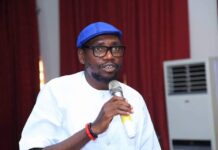EFFIONG BOB: MATTERS ARISING
Philip Afaha
One thing that distinguishes a public intellectual from ordinary folks is the additional capacity to exert his mental capital to both the academic audience and the public space. It is through writings that legends preserve their thoughts and exploits as a guide for posterity. Indeed, when Effiong Bob presented his treaties “Independence Of The Legislature In Nigeria: Matters Arising” while still serving as a senator of the Federal Republic, most Nigerians were not surprised given his intellectual sagacity and knowledge of the workings of the legislature. Compressed in 212 pages and published by Mabrell Press in 2010, the book started-off with an assurance to combine both historical facts and academic theories to analyse contemporary issues in the Nigerian polity. The title of the book conjures its central theme; and reveals an attempt by an expert-insider to explain the nuances of lawmaking, its complexities and inter-governmental relations in Nigeria with special focus on the States and National Assembly. The book emphasises the importance of the legislature as “the institution through which the will of the people is expressed” but regretted that its growth has been stifled by the incessant interruptions of Nigerias democratic culture by military interventions. The book also interrogates the challenges in the application of Montesquieus doctrine of separation of powers in Nigeria. Bob traced the history of the executive interference in the Nigerian legislature to the Decree-1 of 1966 when the power of lawmaking was first transferred to a military council. Intriguingly, Bobs experinces in the executive arm also drips throughout the pages. His stint as chairman of Nsit Ubium Local Government Area during the military era, then as Attorney General where he recruited and led a crack team of legal experts that represented Akwa Ibom to push for Resource Control at the Supreme Court in the twilight of the 4th Republic. Every reviewer will concede that Bob devoted his book to explain the meaning and workings of the legislature in a manner that would appeal to a broader spectrum of the society with an almost second-to-none analysis of its complexities. Although Effiong Bob does not cut the picture of a typical classroom academic but very few scholars have influenced discourses on public administration as he did within the past three decades. I had a singular opportunity of reading a couple of his writings and can conveniently declare that his seminal arguments on the legislature are emanations from his background first as a lawyer, and then his cognate experience as a politician with stints in both the executive and the legislature. Effiong Bobs contribution to the pool of knowledge on legislature is not in doubt. Indeed, no comprehensive research on the Nigerian legislature can be concluded without a footnote on Effiong Bob. Intriguingly he achieved this feat during his busy days as Chairman of the Senate Services Committee in the National assembly.
The gist of the work is in chapter seven of the book. To Bob, theres no such thing as total independence of the legislature at any level of government in the true sense of the word, rather, what obtains is inter-dependence of all arms of government. Bob recalls how the legislature depends on the executive to send in draft laws, while the executive waits, often with bated breath, hoping that these draft laws are not extensively tinkered with during his days in the parliament. Even though the 1999 Nigerian Constitution professes separation of powers among the arms of government, such separations are often threatened by executive interference that always results in altercations and delays. The fallouts of such frictions include incessant impeachments of leadership of the legislatures at the State and Federal chambers, perennial frustration of constitution amendment processes, delays in passage of bills, budget padding, etc. As if pre-empting President Buharis recent Executive Order No.10 on financial autonomy for State legislatures and the judiciary, Bob had argued in 2010 that the independence of the legislature can best be enhanced through a tinkering of the constitution to provide for a separate funding on the basis of first-line-charge for the legislative arm of government. While he agrees with John Locke (1690) and Montesquieu (1748) on the need for separation of powers, opined that a self-accounting legislature is sine-qua-non for good governance he warned that separation of powers does not translate to a total absence of relationship or influence among the three arms of government. The book concludes with a postscript on the constitutional crisis that emanated from the death of President Umoru Yaradua and the transition of power to Vice President Goodluck Jonathan in 2010. As a key player in the transition drama which tested the relevance of the legislature in Nigeria, Bob captured the intrigues as the most trying moment in Nigerias political history in recent memory. An excursion through this seminal work reveals Effiong Bob as a man who knew his onions in democratic governance with cerebral exactitude, and as a political leader-cum writer in the cast of Zik, Ghandi, Churchill and other greats. As admitted by Sen David Mark who wrote its foreword, the work stands out as another selfless contribution to advancing democracy in Nigeria, in an intellectual sense. Ostensibly, Effiong Bobs vast experiences as a politician gave him the oxygen for this effort having served at both the executive and the legislature at the state level. His foray into national politics was no less impactful; at different times he served as a Senator and Pro-Chancellor of the University of Benin. Indeed, on the strength of his broad experiences in public offices that spans over 3 decades and cuts across all levels of governance system, it is safe to conclude that nobody could have told the story of the legislature better than Effiong Bob. He sub-captioned his work Matters Arising, aptly so, as the book throws up new insights and conversations as one peruses.
By Philip Afaha






































